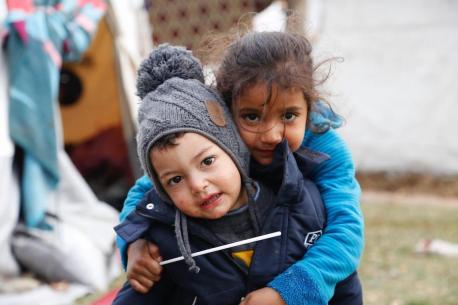
Powerful Earthquake Strikes Afghanistan and Pakistan
Hundreds are dead; many affected areas remain completely inaccessible; UNICEF is prepared to deliver lifesaving supplies in Afghanistan and Pakistan.
***Afghanistan/Pakistan Earthquake Update: October 30, 12:30 p.m., EDT***
A photo from Lady Reading hospital in Peshwar, Pakistan. Nearly half of those injured during the earthquake were children.

Shahzaib, 6, is recovering from hand surgery. He was playing in the street outside his home in Peshawar when he was hit by the debris of a house that collapsed during the quake. More photos available via UNICEF Pakistan.
"Many people are sleeping outdoors, braving temperatures for fear of aftershocks."
The destruction wrought by Monday’s devastating earthquake continues to grow. Pakistan has reported at least 272 deaths and 1,844 injuries (nearly half of them children), and damage to more than 8,453 homes, 235 schools, and many roads and bridges. Afghanistan has tallied at least 121 deaths, 558 injuries, and damage to more than 7,600 homes.
Given the inaccessibility of the affected regions, as well as heavy snowfall and rain, authorities in both countries expect the death toll and damage to increase “…once relief workers return from remote villages on foot or by donkey,” according to the "New York Times/AP".
In addition, “Many people are sleeping outdoors, braving freezing temperatures for fear of aftershocks,” an Afghani governmental official said.
While Pakistan hasn’t yet requested UNICEF aid, Afghanistan has. UNICEF is primed to support humanitarian efforts in both countries, including the provision of thousands of newborn baby kits, over 10,000 micronutrient packets, at least 1,000 therapeutic food cartons, and school kits and supplies to help meet the educational needs of 42,000 children. Please support UNICEF’s emergency relief efforts for children.
***Afghanistan/Pakistan Earthquake Update: October 28, 7:40 a.m., EDT***
A photo from Lady Reading hospital in Peshwar, Pakistan. The earthquake has left a trail of destruction in two countries.

Affan, 20 months old (with his father Ramzan) is recovering from head surgery. He was injured when a concrete block fell on him during the earthquake. “I had no hope when I saw him crushed under the block which had fallen on him,” says his Ramzan, “I cannot think why such a calamity befell my little boy, but they are a test for our faith and patience.” More photos available via UNICEF Pakistan.
***Afghanistan/Pakistan Earthquake Update: October 27, 8:10 a.m., EDT***
Some areas are now completely inaccessible; much of the region is hard to reach in ordinary circumstances.
The death toll in the powerful earthquake has now surpassed 300 with at least 1,000 injured. Heavy rain and snow have been pounding the remote, mountainous areas affected by the earthquake. Communication is poor and access difficult due to the tough terrain and security operations.
“We are extremely concerned for the safety and wellbeing of children, who are already the most at risk in any disaster and are now in danger of succumbing to the elements as temperatures plummet," says Karin Hulshof, UNICEF Regional Director for South Asia.
UNICEF Afghanistan and Pakistan are working with their national governments and are prepared to deliver lifesaving supplies to tens of thousands of affected children and their families—warning that health, nutrition, hygiene and education services will now be under exceptional stress, placing more children at risk. Please support UNICEF’s emergency relief efforts for children.
The latest from the #AfghanistanEarthquake: https://t.co/0uu57AS04J via @UNOCHApic.twitter.com/e8v4c4lK9F
— UNICEF Afghanistan (@UNICEFAfg) October 27, 2015
***Afghanistan/Pakistan Earthquake Update: October 26, 1:55 p.m., EDT***
A powerful earthquake of 7.5 magnitude struck northern Afghanistan this morning with tremors felt in India, Pakistan and Tajikistan. Initial reports indicate that more than a hundred people may have died—including 12 schoolgirls in one northern Afghan town—with many reports of collapsing structures.
Tremors were felt across Afghanistan, India and Pakistan.
UNICEF Afghanistan is working to assess the effect of the earthquake on the country's children and families.
UNICEF in Afghanistan
UNICEF has 326 staff members in 14 Afghanistan field offices, and has been working continuously in Afghanistan since 1949. Over the past 66 years, UNICEF has promoted the rights of children and women throughout the country and worked to bring basic services, including education, health, protection, water and sanitation to those who are most vulnerable.
Working to Protect Children in Disaster's Aftermath
In the aftermath of earthquakes – such as those that struck Nepal in April and May – UNICEF acts immediately to restore basic services such as health, water and sanitation. It establishes Child-Friendly Spaces where kids can access education and psychosocial support.
In the weeks and months following a disaster, UNICEF oversees rehabilitation and long-term reconstruction and supports governments in developing emergency preparedness plans. In addition, UNICEF traces and reunites children with their families. Please support UNICEF’s emergency relief efforts for children.


